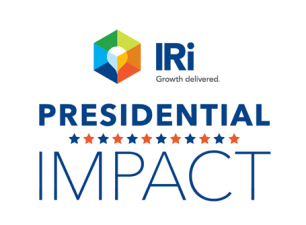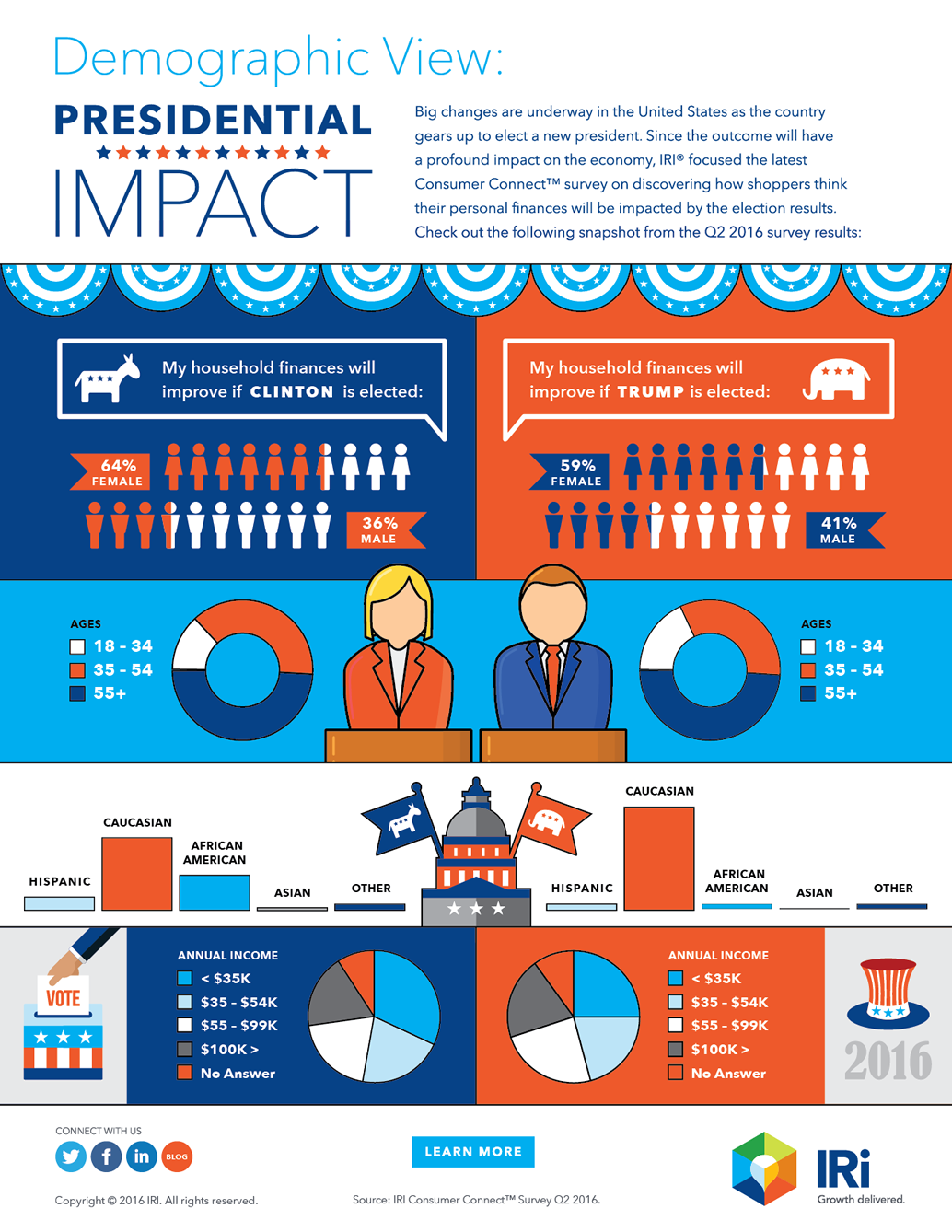Consumers Expecting their Financial Health to Deteriorate: IRI 8/31/2016
Nearly two-thirds of U.S. consumers believe their financial health is poised to deteriorate in 2017 regardless of who wins the presidential election this year, driving them to pay closer attention to how they spend -- and to focus more on private brands -- according to IRI's recent Consumer Connect survey. In contrast, consumers have been feeling a bit more optimistic about their personal finances and putting the Great Recession behind them for the past couple of years.
Overall, 64 percent of consumers believe their households’ financial health will decline if Donald Trump is elected compared to 60 percent of consumers if Hillary Clinton is elected. In addition, 36 percent believe their households’ financial health will improve if Trump is elected compared to 40 percent if Clinton is elected. (To learn more about the demographic breakdown of consumer sentiment regarding the presidential election, check out the IRI infographic below).
“While Americans’ attitudes towards personal finances have improved in recent years, this election process appears to signal a shift in consumer sentiment,” said Susan Viamari, vice president of Thought Leadership for IRI. “However, the changing of the guard at the White House always represents uncertainty, but this year close to 60 percent of consumers feel that their financial health will deteriorate no matter who is elected president. This will absolutely impact retailers and CPG manufacturers, as they brace for a tightening of the purse strings.”
Feeling the Pinch
For years, IRI has been studying the types of trade-offs that consumers make when they feel their budgets are being squeezed. Some behaviors, such as list-making and shopping at multiple stores, become part of the regular routine, even when finances are looking stable or are improving. The following are shopping behaviors that consumers say they will be adopting:
- 62 percent of consumers who think their finances will decline say they will make written shopping lists, compared to 59 percent who think their finances will improve
- 75 percent of consumers who think their finances will decline say they will buy needed items when they are on sale to save money, compared to 54 percent who think their finances will improve
- 62 percent of consumers who think their finances will decline say they will purchase private label products to save money, compared to 41 percent who think their finances will improve
- 48 percent of consumers who think their finances will decline say they will try new, lower-priced brands to save money, compared to 36 percent who think their finances will improve
- 38 percent of consumers who think their finances will decline will visit multiple retailers to keep the grocery bills down, compared to 35 percent who think their finances will improve
- Splurging on Indulgences
- 56 percent of consumers want gourmet food and beverages
- 55 percent of consumers desire local/artisan food and beverages
- 51 percent of consumers require prepared/easy-prep meal solutions
- 51 percent of consumers fancy natural/organic food and beverages
- 48 percent of consumers wish for technology that would make shopping the store more exciting
- 39 percent of consumers would like the ability to purchase online and pick up in store
During the Great Recession, younger consumers had the most pessimistic outlook. However, the tide is definitely turning as the latest IRI survey results found that younger consumers are now more optimistic than older consumers about their personal finances in the next six months prior to the inauguration of a new president. A full 78 percent of consumers aged 18-34 and 69 percent aged 35-54 believe their households’ financial health will improve in the next six months, compared to 60 percent aged 55 and up.
- 38 percent of 18- to 34-year-olds and 31 percent of 35- to 54-year-olds are willing to pay more for food/beverages that are natural and organic compared to 21 percent of those aged 55 and up
- 58 percent of 18- to 34-year-olds and 52 percent of 35- to 54-year-olds are willing to pay more for OTC medications that treat multiple symptoms compared to 43 percent of those aged 55 and up
- Still, these younger consumers are willing to make trade-offs to save money. After all, they have come up in a very conservative place in time and frugality is becoming programmed into their CPG shopping journey.
- 53 percent of 18- to 34-year-olds and 51 percent of 35- to 54-year-olds buy beauty products that are not their regular brands because they’re on sale compared to 40 percent of those aged of 55 and up.
- 59 percent of 18- to 34-year-olds and 48 percent of 35- to 54-year-olds buy food/beverage brands that are not their preferred brands because they have a coupon compared to 41 percent of those aged 55 and up.
- 54 percent of 18- to 34-year-olds and 46 percent of 35- to 54-year-olds buy OTC medications that are not their preferred brands because they have a coupon compared to 36 percent of those aged 55 and up.
About the IRI Consumer Connect Survey
The IRI Consumer Connect survey is a new quarterly survey designed to gauge consumers’ financial confidence and understand how their financial situations are impacting the way they shop for, purchase and consume CPG products. It is an online survey of more than 2,200 nationally representative respondents. The Q2 2016 survey was fielded the first half of June. For more information about customizing the research for a particular category or industry, please contact IRIMarketing@IRIworldwide.com.


